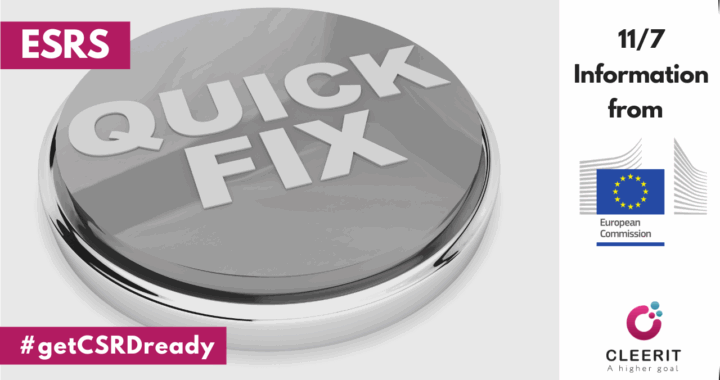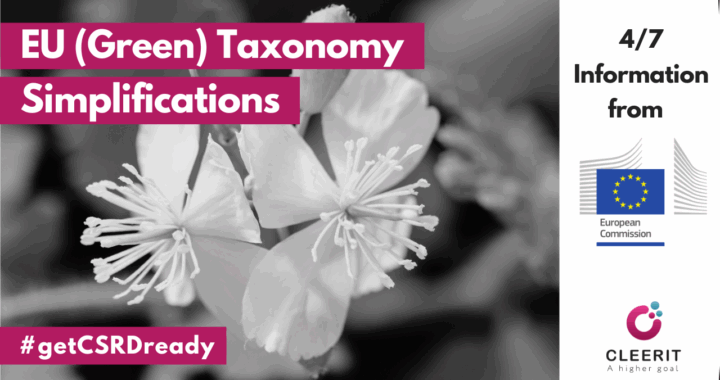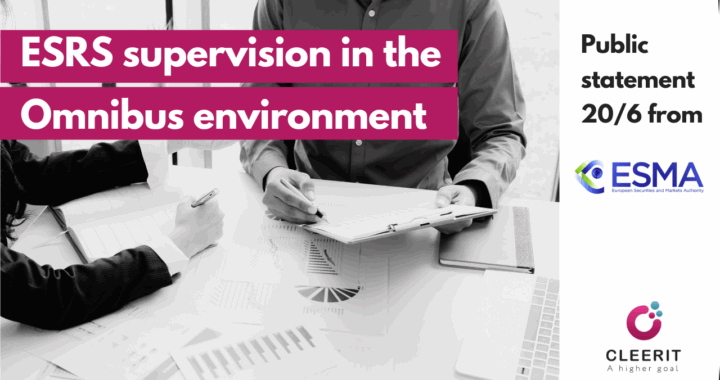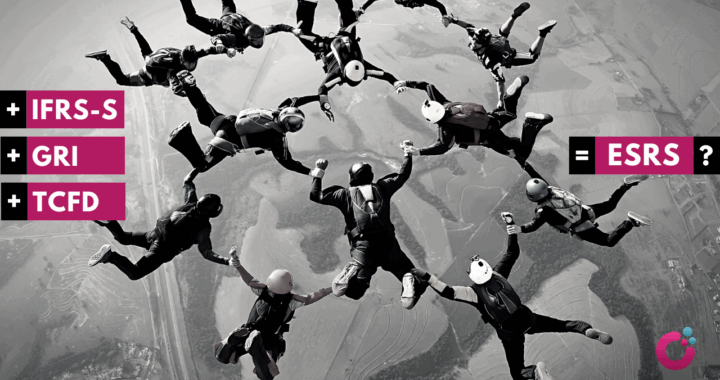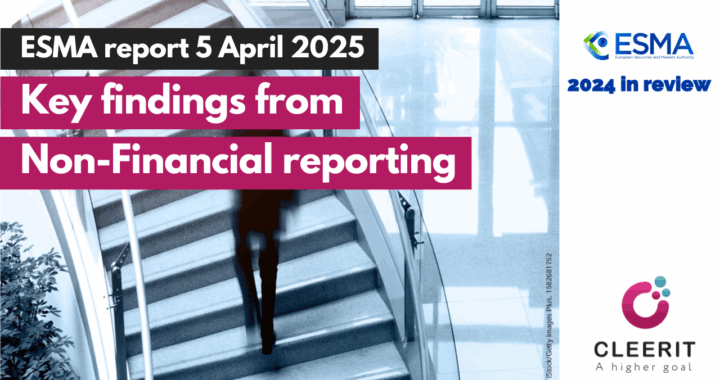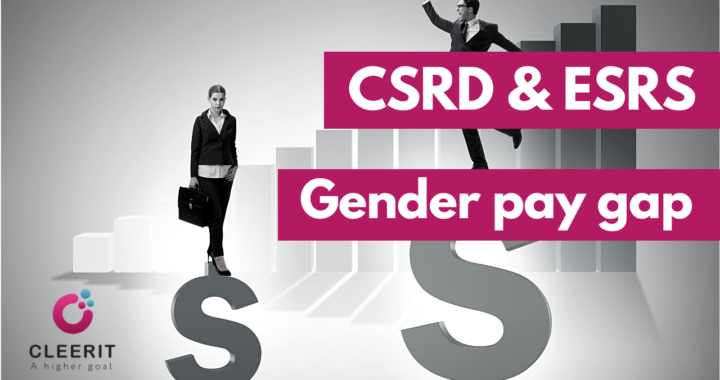The European Sustainability Reporting Standards (ESRS), for use by all companies subject to the CSRD, are built on a double materiality approach, whereby impact materiality and financial materiality are equally important – the exception being negative impact on human rights which one could argue takes precedence.
ESRS (drafted by EFRAG, technical advisor to the European Commission) state that a company’s impact on people and the environment, and its financial effects from risks and opportunities, arising from its dependencies on resources and relationships, may be inter-related and interdependent.
A negative impact will likely materialize as a negative financial effect for the company, at least in the long term. But a company also faces sustainability related risks that are not necessarily related to its impacts – climate change being a good example.
The International Financial Reporting Standards on Sustainability (IFRS-sds), issued by ISSB, also recognize that the two perspectives are linked: “an entity’s ability to generate cash flows over the short, medium and long term is inextricably linked to the interactions between the entity and its stakeholders, society, the economy and the natural environment throughout the entity’s value chain. … Together, the entity and the resources and relationships throughout its value chain form an interdependent system in which the entity operates.” (S1, paragraph 2)
So, what are the main differences between the two standards – apart from IFRS-sdc only covering one topic (climate change) in stage one, compared to 10 ESG topics for ESRS?
And how do TCFD, SASB and GRI fit in the picture?
IFRS Sustainability by ISSB
The International Sustainability Standards Board (ISSB) was created by the IFRS Foundation in 2021 as a sister board to the International Accounting Standards Board (IASB), to address the needs of investors and the financial markets for sustainability information – in particular sustainability-related risks and opportunities that are becoming increasingly important for investment decisions.
ISSB’s main objective is to respond to the need for such information by issuing unified IFRS Sustainability standards (IFRS-sds), since a fragmented landscape of voluntary, sustainability-related standards and requirements add cost, complexity and risk to both companies and investors.
The aim is to help companies to report what is needed for investors across markets globally, to support investor decision-making and facilitate international comparability to attract capital.
ISSB has focused on ensuring transparency through the disclosure of the company’s sustainability related risks and opportunities, and related control systems – including who is in charge, how do they get relevant information and if they have the necessary skills to manage this information and its consequences for the company’s strategy and business model.
Materiality follows the same principle as the IFRS Accounting Standards definition of “material”: “could reasonably be expected to influence investor decisions”.
This is logical since the IFRS-sds stakeholder is “primary users of general-purpose financial reports in making decisions relating to providing resources to the entity” – meaning the investors.
Sue Lloyd (Vice Chair ISSB) explained that the IFRS-sds standards aim to help companies and their investors, identify “how sustainability can affect its prospects”, by focusing on “how it maintains its resources and relationships, how it manages its dependencies on them, and how its impacts on these resources and relationships give rise to sustainability related risks and opportunities for the company”.
The company’s impact on the environment and people therefore only becomes relevant (material) if likely to translate into financial effects for the company.
IFRS-sds does not require companies to disclose a specific climate transition pathway aligned with common objectives like net zero or the 1.5-degree scenario – although they indirectly encourage to do so.
As Sue Lloyd put it: “The role of ISSB is providing information to investors, not to tell companies how to do business, have transitions plans, etc”.
It is also important to note that while IFRS-sds aim to shed light on the resilience of the entity’s strategy and its business model with regards to sustainability-related risks, an entity need not provide quantitative information about the current or anticipated financial effects of a sustainability-related risk or opportunity if the entity determines that:
- those effects are not separately identifiable
- the level of measurement uncertainty involved in estimating those effects is so high that the resulting quantitative information would not be useful
- the entity does not have the skills, capabilities or resources to provide that quantitative information (S1 paragraphs 38-39).
Since the first set of IFRS-sds only cover the topic climate change, it refers to the topical SASB standards (in step one), organized by industry, to help companies identify other topics that could potentially give rise to sustainability related material risks and opportunities, and related disclosures.
—
Sustainability Accounting Standards Board (SASB)
The Sustainability Accounting Standards Board (SASB) was founded as a nonprofit organisation in 2011 to help businesses and investors develop a common language about the financial impacts of sustainability.
SASB Standards help companies disclose relevant sustainability information to their investors. They are industry-based as risks and opportunities likely to be “decision-useful” for investors vary by industry.
Available for 77 industries, SASB Standards aim to help identifying the sustainability-related risks and opportunities most likely to affect an entity’s cash flows, access to finance and cost of capital over the short, medium or long term and the disclosure topics and metrics that are most likely to be useful to investors.
From CDSB, IIRC and TCFD to SASB and ISSB
The Climate Disclosure Standards Board (CDSB), created in 2007, offered companies a framework for reporting environment and social information with the same rigour as financial information. The CDSB Framework formed a foundation for the Task Force for Climate-Related Financial Disclosures (TCFD) recommendations and sets out an approach for reporting environmental and social information in mainstream reports, such as annual reports, 10-K filing, or integrated reports.
The International Integrated Reporting Council (IIRC), a global coalition of regulators, investors, companies, standard setters, the accounting profession and NGOs, was formed in August 2010 with the aim to create a globally accepted framework for a process that results in communications by an organisation about value creation over time, as the next step in the evolution of corporate reporting.
The Financial Stability Board (FSB) created the Task Force on Climate-related Financial Disclosures (TCFD) in 2015 to improve and increase reporting of climate-related financial information.
Over the years, the corporate sustainability disclosure landscape became very complex. Many global businesses and investors called for simplification and clarity in this landscape.
In response, in November 2020 the International Integrated Reporting Council (IIRC) and the Sustainability Accounting Standards Board (SASB) announced their intention to merge into the Value Reporting Foundation, which was officially formed in June 2021. By integrating two entities that were focused on enterprise value creation, the merger signaled significant progress towards simplification.
On 3 November 2021 at the COP26 climate conference the IFRS Foundation Trustees announced the consolidation of the Value Reporting Foundation (VRF) and the Climate Disclosure Standards Board (CDSB) into the IFRS Foundation, to support the work of the newly established International Sustainability Standards Board (ISSB).
As of August 2022, the International Sustainability Standards Board (ISSB) of the IFRS Foundation assumed responsibility for the SASB Standards. The ISSB has committed to maintain, enhance and evolve the SASB Standards and encourages preparers and investors to continue to use the SASB Standards.
In July 2023 the Financial Stability Board (FSB) announced that the work of the Task Force on Climate-related Financial Disclosures (TCFD) has been completed, with the ISSB Standards marking the ‘culmination of the work of the TCFD’. Having fulfilled its remit, TCFD disbanded in October 2023.
Companies applying IFRS S1 General Requirements for Disclosure of Sustainability-related Financial Information and IFRS S2 Climate-related Disclosures will meet the TCFD recommendations as the recommendations are fully incorporated into the ISSB Standards (and into ESRS). The FSB has asked the IFRS Foundation to take over the monitoring of the progress of companies’ climate-related disclosures.
Companies can continue to use the TCFD recommendations should they choose to do so, and some companies may still be required to use the TCFD recommendations. Using the recommendations can be a good entry point for companies as they move to use the ISSB Standards (or ESRS).
—
The IFRS-sds standards are voluntary and policy-agnostic
More than 20 jurisdictions have already decided to use or are taking steps to introduce ISSB’s IFRS Sustainability Standards (sds) in their legal or regulatory framework, including Australia, Brazil, Canada, Hong-Kong, Japan, Malaysia, Mexico, Singapore, South Korea and the UK. Together, these jurisdictions account for nearly 55% of global GDP, more than 40% of global market capitalisation and more than half of global greenhouse gas emissions.
IFRS-sds standards have also been endorsed by the International Organization of Securities Commissions (IOSCO), calling on its 130 member jurisdictions — capital markets authorities that regulate more than 95% of the world’s securities markets — to consider how they can incorporate the ISSB Standards into their respective regulatory frameworks.
However, supervisory authorities of EU Member States represent over 20% of IOSCO membership, and they will be subject to ESRS standards.
The UK has also committed to its own Transition Plan Taskforce (TPT) Disclosure Framework – “a key building block for delivering a net zero future” – in addition to the IFRS-sds requirements. The TPT builds on the work of the ISSB and supports compliance with IFRS S2.
Unified sustainability reporting practices are an important step towards “more resilient economics, serving people and life better”, as noted by ISSB Chair Emmanuel Faber.
Critics accuse the ISSB of “high-jacking” sustainability reporting by claiming the IFRS-sds standards to be a “global baseline”, while narrowly focusing on only one stakeholder (the investor), and neither addressing sustainability per se, nor the management and science-based alignment of sustainability-related issues.
The ESRS standards are forward-driven and support the European Green Deal
The aim of ESRS (Set 1) is more ambitious, and forward-driven. It’s not policy neutral. Together with CSRD, it supports the European Green Deal, a growth strategy for the 27 EU member states.
The EU standards are based on an initial draft prepared by the appointed technical adviser, the European Financial Reporting Advisory Group (EFRAG), following the adoption of the EU Corporate Sustainability Reporting Directive (CSRD), supplementing the directive 2013/34/EU on annual financial statements, consolidated financial statements and related reports.
CSRD now requires companies within its scope to report based on a double materiality approach in compliance with the European Sustainability Reporting Standards (ESRS), adopted by the European Commission as delegated acts.
The aim is not only to help companies to communicate (disclose) sustainability related information, but also to manage their sustainability performance more efficiently, and therefore to have better access to sustainable finance to support the implementation of the European Green Deal.
The European Green Deal represents a growth strategy that aims to “transform the Union into a fair and prosperous society, with a modern, resource-efficient and competitive economy where there are no net emissions of greenhouse gases in 2050 and where economic growth is decoupled from resource use”.
The implementation of the European Green Deal requires that “investors are offered clear, long-term signals to avoid stranded assets and to raise sustainable finance”.
CSRD therefore requires large companies, as well as third-country companies with significant activities in the EU, to disclose information on what they see as the risks and opportunities arising from social and environmental issues, and on the impact of their activities on people and the environment.
The definition of a “large” company is currently being reviewed as part of the Omnibus simplification package.
The aim is to help investors, civil society organisations, consumers and other stakeholders to evaluate the sustainability performance of companies, as part of the European Green Deal.
The aim of the European Green Deal is to improve the well-being and health of citizens and future generations by providing:
- fresh air, clean water, healthy soil and biodiversity
- renovated, energy efficient buildings
- healthy and affordable food
- more public transport
- cleaner energy and cutting-edge clean technological innovation
- longer lasting products that can be repaired, recycled and re-used
- future-proof jobs and skills training for the transition
- globally competitive and resilient industry
To achieve the goals, the ESRS address the needs of a large group of stakeholders:
- Affected stakeholders: individuals or groups whose interests are affected or could be affected – positively or negatively – by the undertaking’s activities and its direct and indirect business relationships across its value chain (ESRS 1, sec 3.1 par 22 a)
- Users of sustainability statements: primary users of general-purpose financial reporting (existing and potential investors, lenders and other creditors, including asset managers, credit institutions, insurance undertakings), and other users of sustainability statements, including the undertaking’s business partners, trade unions and social partners, civil society and non-governmental organisations, governments, analysts and academics. (ESRS 1, sec 3.1 par 22 b)
- In addition, common stakeholders are: employees and other workers, suppliers, consumers, customers, end- users, local communities and persons in vulnerable situations, and public authorities, including regulators, supervisors and central banks. (ESRS 1, AR 6)
- Nature may be considered as a silent stakeholder. In this case, ecological data and data on the conservation of species may support the undertaking’s materiality assessment. (ESRS 1, AR 7)
This multi-stakeholder approach is consistent with research findings in the fields of corporate strategy and strategy execution.
Companies face many different stakeholders and have to manage different – sometimes contradictory – perspectives to be successful, given the interdependent system in which they operate. This is also why the narrow focus on investors in IFRS-sds has been criticized.
When creating the ESRS, EFRAG (EU) built on – and also aimed to contribute to – internationally recognized existing reporting standards and guidelines, including TCFD, GRI, SASB, the International Integrated Reporting Council (IIRC), the Climate Disclosure Standards Board (CDSB) and CDP (formerly the Carbon Disclosure Project), while also taking into account other science-based guidelines, as well as existing EU regulation and international instruments for responsible business conduct.
TCFD, ESRS and IFRS-sds
The Task Force on Climate Related Financial Disclosures (TCFD) was established in 2015 by the Group of 20 (G20) and the Financial Stability Board (FSB), as a response to the failings of the 2015 Paris Agreement.
One of the most significant problems identified was the lack of transparency and international standards by which countries demonstrate or disclose that they are meeting their commitments.
To address the issues stemming from the 2015 Paris Agreement, the Task Force published recommendations designed to standardise worldwide climate-related disclosures that could “promote more informed investment… and in turn, enable stakeholders to understand better concentrations of carbon-related assets in the financial sectors.”
The TCFD climate-related disclosures provide information to investors about what companies are doing to mitigate the risks of climate change, as well as transparency on the way in which they are governed with relation to these matters.
Both EFRAG and ISSB have incorporated the TCFD climate-related disclosures, so there is no need to report on TCFD separately if you report according to ESRS or IFRS-sdc.
But both ESRS and IFRS-sds go beyond TCFD disclosures, so TCFD alone is no longer enough.
When comparing TCFD with ESRS it must also be noted that TCFD is on climate only and ESRS are covering also numerous other sustainability matters besides climate.
ESRS also include detailed minimum disclosure requirements (MDR) on Policies, Actions and Targets (PATs), designed to shed light on – and guide – impact, risk and opportunity MANAGEMENT, in addition to governance and control mechanisms.
These MDR on Policies, Actions and Targets are absent in both TCFD and IFRS-sds.
GRI, ESRS and IFRS-sds
The Global Reporting Initiative (GRI) was founded in Boston (USA) in 1997 following on from the public outcry over the environmental damage of the Exxon Valdez oil spill, eight years previously.
The aim was to create the first accountability mechanism to ensure companies adhere to responsible environmental conduct principles, which was then broadened to include social, economic and governance issues.
GRI became the world’s first globally accepted, voluntary, standards for sustainability reporting.
Over 10,000 companies from more than 100 countries use GRI. 78% of the world’s biggest 250 companies by revenue (the G250) and 68% of the top 100 businesses in 58 countries (5,800 companies known as the N100) have adopted the GRI Standards for reporting. (KPMG Survey, Oct 2022)
The ESRS have adopted the same definition for impact materiality as GRI and have leveraged GRI’s expertise.
As IFRS-sds, on the other hand, does not incorporate impact materiality, it “delegates” this task to GRI, stating that:
“The combination IFRS-sds, focused on meeting investor needs, alongside GRI standards, focused on broader stakeholder needs, as a package, can be an efficient reporting system to allow companies to report across their stakeholders”. (Sue Lloyd, Vice Chair ISSB)
ESRS interoperability
ESRS – IFRS-sds
EU/EFRAG and the ISSB have ensured a very high degree of interoperability between the two sets of standards. Companies that are required to report in accordance with ESRS will to a very large extent report the same information as companies that use the two ISSB standards IFRS S1 & S2.
Specific consideration has been given to the definition of financial materiality, particularly in ESRS 1 paragraph 48 of the Delegated Act. Material financial information under ESRS is now focused on the needs of primary users (investors), assuming that the needs of other stakeholders are satisfied either through impact materiality information or through the information needed by investors.
For financial materiality, an undertaking that applies ESRS is expected to be able to comply with the identification of the risks and opportunities to be disclosed under IFRS-sds (however, note that EFRAG’s proposed Materiality Assessment Implementation Guidance for public input on August 23 does not state the inverse to be true).
The ESRS follow the same structure as the ISSB (Governance—Strategy—Risk Management—Metrics & Targets), as first proposed by the Task Force on Climate related Financial Disclosures (TCFD), with the necessary adaptions to account for the double materiality principle and to secure an efficient interaction between the general disclosures and the various topics that the ESRS have to cover according to the CSRD.
ESRS – GRI
EU/EFRAG and GRI acknowledge that they have achieved a high level of interoperability between their respective standards in relation to impact reporting.
ESRS and GRI definitions, concepts and disclosures regarding impacts are therefore fully or, when full alignment was not possible due to the content of the CSRD legal mandate, closely aligned.
For impact materiality, an assessment performed under GRI constitutes a good basis for the assessment of impacts under ESRS.
International instruments (UN, OECD)
In an effort to enhance further alignment and convergence for companies in relation to due diligence expectations, ESRS also take account of the international instruments of the UN Guiding Principles on Business and Human Rights and the OECD Guidelines for Multinational Enterprises to the greatest extent possible, as required by the CSRD, without prejudice to the EU legislative processes regarding sustainability due diligence (the EU directive CSDDD).
ESRS – the most comprehensive one-stop-shop sustainability reporting standards
As such, ESRS are currently the most comprehensive one-stop-shop reporting standards for sustainability-related impacts, risks and opportunities – covering 10 topics, including more than 90 sub-topics to be assessed (ESRS 1, AR 16) and potentially material for a company and/or its many different stakeholders.
ESRS are also the only standards requiring assurance.
In addition, ESRS prescribe a scienced-based methodology to increase sustainability strategy execution success, a pre-requisite to improving actual sustainability performance: the activity-based Minimum Disclosure Requirements (MDR, sections 4.2 and 4 in ESRS 2) for Policies, Actions (including resources) and Targets (PATs).
As an example – and going well beyond IFRS S2 – ESRS E1 requires companies (in addition to ESRS 2 MDR-A) to detail climate change mitigation actions taken in the reporting year and planned for the future,
- presented by decarbonisation lever (e.g., energy or material efficiency and consumption reduction, fuel switching, use of renewable energy, phase out or substitution of product and process) including the nature- based solutions
- describing the outcome of the actions for climate change mitigation, including the achieved and expected GHG emission reductions
- relating significant monetary amounts of CapEx and OpEx required to implement the actions taken or planned
- stating whether the GHG emission reduction targets are science- based and compatible with limiting global warming to 1.5°C
- stating which framework and methodology have been used to determine targets and what the underlying climate and policy scenarios are.
Increasing your chances of succeeding
Reporting is necessary, but if we are looking to transform, reporting is only a means to an end, not the end.
Indeed, time and time again, research findings conclude that strategies only have a 30% chance of succeeding, due to insufficiencies in execution. And failing to build resilient and sustainable business models is not an option.
By applying the inclusive governance model described in the ESRS Minimum Disclosure Requirements, the success rate increases.
Already in the 90’s, the Harvard strategy expert, Michael Porter, described the essence of strategy as “deliberately choosing a different tailored set of activities to deliver a unique mix of value”, and defined strategy as “an activity system”. (Porter, 1996, p. 64, 69-70)
To succeed, companies need to make choices and allocate resources. Resources are “intermediate between activities and advantage”, reflecting “prior managerial choices” (Porter, 1991, p. 108-109).
Empirical research has also confirmed the importance of connecting strategy to day-to-day activities and resource allocation. In successfully executing companies, 77% effectively translate their strategy into operational mechanisms and monitor day-to-day progress (HBR, The Gap Between Strategy and Execution, 2017, p. 62).
So, when disclosing on ESG policies, actions, targets and metrics in accordance with ESRS Minimum Disclosure Requirements, it is important to keep in mind that doing this right will not only help companies with ESRS reporting. It will help them to successfully craft and execute strategies and increase overall performance.
Reporting is only a means to an end, not the end
While all standards concerned with sustainability are important steps in the right direction – if you really want to show the market and your stakeholders that you are serious about sustainability, ESRS is currently your best option.
With a multi-stakeholder approach, and an IRO-, policy-, target- and activity-based methodology, as well as information on key elements of the entity’s strategy that relate to or affect sustainability matters, ESRS provide increased transparency and reliability for management, stakeholders, investors and financial institutions.
If you are aiming for a good ESG rating and access to sustainable finance, now is the time to dig in.
Indeed, the Ellsberg paradox – a deviation from the model of rational choice – is a demonstration that a person “tends to prefer choices with quantifiable risks over those with unknown, incalculable risks”.
In other words, we are more likely to bet on an outcome with unfavorable odds, than on one where we do not know the odds at all.
This goes to show that ignorance of the future carries a cost today: ambiguity makes risks uninsurable, or at the very least expensive. The less insurers know about risks, the more capital they need to protect their balance-sheets against possible losses. The same reasoning is likely to be true also for investors.
ESRS is a major opportunity to build awareness, resilience, efficiency and sustainable growth opportunities.
So, with or without Omnibus, it’s important to keep in mind that reporting is only a means to an end, not the end.
Setting up the management and control systems needed to identify, govern and manage your sustainability-related impacts, risks and opportunities, is needed to future-proof your business and safe-guard your competitive advantage.
And you will need the support of a fit-for-purpose ESRS-ready sustainability strategy, governance & reporting software to guide you, save time, increase decision-usefulness and decrease your burden ➡ Cleerit ESG.
#getCSRDready, #CSRD, #ESRS, #ESG, #Strategy, #Governance, #SustainabilityReporting, #Digitalisation, #Cleerit
—
You are welcome to follow our page for more information and advice on CSRD & ESRS: https://www.linkedin.com/company/cleerit
